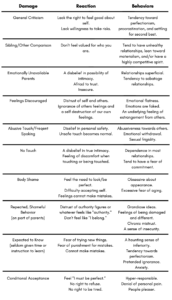“Am I Good or Bad?” 5 Habits to Grow Initiative
Shortly after graduating from college, I found a job teaching kindergarten in north Georgia. Each day, I had the chance to teach and invest in 20 adorable 5- and 6-year-olds. I loved that job, that school, and my students; it was a once-in-a-lifetime opportunity and one that I feel immensely blessed to have had.
One of my favorites memories of that job was watching my students during “free choice center” time. Some of the children would instantly go to the book corner, silently pouring over picture books while cuddled up on beanbag chairs. Other kids would head to the dress-up corner, where disagreements about who would be the “mom” and “dad” soon ensued. Still other kids would play with blocks, do puzzles, or draw. Each child was able to select an activity that aligned with their own personal interests and preferences. Watching them express themselves in this way was amazing!
Initiative v. Guilt
If you remember, in Erikson’s first psychosocial stage (“trust versus mistrust”), babies/toddlers must determine if the world around them–specifically the people in it–is trustworthy. In the second stage (“autonomy versus shame and doubt”), children determine if they are able to do things themselves and develop their own opinions, or if they must rely on others to do that for them. Erikson’s third stage, initiative versus guilt which occurs between ages three to five), focuses on developing purpose and asks the overarching question, “Am I good or bad?”
If children have developed properly in the first two stages, they enter stage three believing that the world is trustworthy; they also feel secure exhibiting independence and autonomy. In this third stage, children now set about exerting their power over themselves and their world. They begin to explore their own abilities, developing ambition and direction. It is important in this stage that caretakers give children the space and freedom to explore, as well as offer guidance to make appropriate choices.
“Am I Bad?”
This stage can be frustrating for parents and caregivers; many want to overly exert influence upon their children in regard to their choice of friends, selection of activities, or even the way in which their children look at the world. However, it is important that children have the space to make their own decisions. If they don’t have that freedom, they may begin to fear new things or, even more concerning, feel as if they are doing something wrong when they do it independently. Making mistakes and overcoming them is an important element of stage three. Children who experience guilt when they make mistakes will take these as a sign of personal failure and are often left with the idea that they are “bad.”
Damages that occur during this stage, as well as the previous two stages, have the ability to impact the rest of our lives. All of the below types of damage are forms of rejection and can result in many negative behaviors. (You can also download this chart as a FREE PRINTABLE!)

Do you, yourself, ever have this feeling that you are “bad?” Do you fear taking the initiative to make a decision because you fear it will be wrong? Are you comfortable letting yourself make mistakes? If not, perhaps you never fully developed in the “initiative versus guilt” stage.
5 Habits to Grow Initiative
1. Take a chance on yourself. You have value because you are a child of God. No matter what messages you were sent as a child, you are not “bad.” Beginning to believe in yourself and taking a chance to see what you are capable of are great ways to begin growing initiative.
2. Don’t be afraid to speak up. The world is always in need of fresh, new ideas. If as a child, you were rejected or given the idea that you were not of worth, you may be afraid to share your ideas. However, your ideas have worth. Take a risk and share them with others.
3. Consider every opportunity. Many experiences in life do not feel like “opportunities;” instead, they feel like setbacks. However, if you are able to pivot your thinking and begin viewing such experiences as a chance to grow and change, you will open yourself up to new possibilities.
4. Try something new. If, during your critical initiative versus guilt years, you were discouraged, rejected, or made to feel like all of your efforts were bad, it is likely you have spent much of your life doing the same ole’ thing. However, branching out and trying a new experience can be a healing, affirming experience.
Nancy Rockey (2017), founder of Life Renewal (former Fixable Life, Inc.) also suggests an activity to help yourself move past the damage you may have experienced in this stage:
Look back and ask yourself exactly what occurred in your early years that may have sabotaged your growth. When you know what that is, get out a pen or pencil and a pad of paper and write about it. Then share what you have written with a trusted friend or counselor. Once accomplished, tear up your paper, burn it, drown it or save it in a very safe place. This activity is extremely beneficial for the development of your maturity.
The path to self-discovery is not an easy one. In fact, it can be quite painful unearthing events in our past that have stunted our growth or given us deep scars. However, it is only by dealing with these events and processing their effects that we have the ability to move forward with our lives, experiencing a freedom we have never known.
References
Cherry, K., & Morin, A. (2019). Understanding initiative vs. guilt. Verywell Mind. Retrieved from https://www.verywellmind.com/initiative-versus-guilt-2795737
Rockey, N. (2017). Growing up–step #3 initiative. Life Renewal. Retrieved from https://fixablelife.andrews.edu/2017/09/04/growing-up-step-3-initiative/



